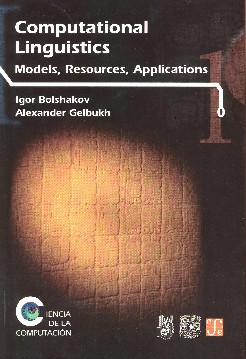
|
FreeComputerBooks.com
Links to Free Computer, Mathematics, Technical Books all over the World
|
|
- Title Computational Linguistics: Models, Resources, Applications
- Author(s) Igor A. Bolshakov and Alexander Gelbukh
- Publisher: IPN-UNAM-FCE, 2004.
- Paperback 186 pages
- eBook HTML and PDF
- Language: English
- ISBN-10: 970-36-0147- 2
- ISBN-13: N/A
- Share This:

|
This comprehensive reference work provides an overview of the concepts, methodologies, and applications in computational linguistics and natural language processing (NLP).
The book is a state-of-the-art reference to one of the most active and productive fields in linguistics. It will be of interest and practical use to a wide range of linguists, as well as to researchers in such fields as informatics, artificial intelligence, language engineering, and cognitive science.
About the Authors- N/A
- Computational Linguistics
- Natural Language Processing (NLP)
- Human-Computer Interaction and Virtual Reality
- Information Retrieval (IR) and Search Engines Design/Implementation
- Theory of Programming Languages

- Computational Linguistics: Models, Resources, Applications (Igor A. Bolshakov, et al)
- The Mirror Site (1) - PDF
-
 Computational Cognitive Modeling and Linguistic Theory
Computational Cognitive Modeling and Linguistic Theory
This open access book introduces a general framework that allows natural language researchers to enhance existing competence theories with fully specified performance and processing components.
-
 Speech and Language Processing (Dan Jurafsky, et al)
Speech and Language Processing (Dan Jurafsky, et al)
This text takes an empirical approach to the subject, based on applying statistical and other machine-learning algorithms to large corporations. It describes a unified vision of speech and language processing. Emphasis is on practical and scientific applications.
-
 Linguistics for the Age of AI (Marjorie McShane, et al)
Linguistics for the Age of AI (Marjorie McShane, et al)
This book summarizes an exciting approach to knowledge-rich natural language understanding, in the context of language - using AI agents. Anyone interested in building cognitive systems that use language should read this book.
-
 Mathematical Linguistics (Andras Kornai)
Mathematical Linguistics (Andras Kornai)
This book introduces the mathematical foundations of linguistics to computer scientists, engineers, and mathematicians interested in natural language processing (NLP). It presents linguistics as a cumulative body of knowledge from the ground up.
-
 Essentials of Linguistics (Catherine Anderson)
Essentials of Linguistics (Catherine Anderson)
This book is about the core areas of theoretical linguistics (phonetics, phonology, morphology, syntax, and semantics), supplemented with discussion of psycholinguistic and neurolinguistic findings. It is suitable for any beginning learner of linguistics.
-
 Analyzing Linguistic Data: Introduction to Statistics using R
Analyzing Linguistic Data: Introduction to Statistics using R
A straightforward introduction to the statistical analysis of language, designed for those with a non-mathematical background. Using the leading statistics programme 'R'. Suitable for all those working with quantitative language data.
-
 How Language Works: The Cognitive Science of Linguistics
How Language Works: The Cognitive Science of Linguistics
This book offers general readers a personal tour of the intricate workings of language. It will focus on a narrow range of topics and themes; there will be no pretense of covering the field in anything like a complete fashion.
-
 The Unicode Cookbook for Linguists (Steven Moran, et al)
The Unicode Cookbook for Linguists (Steven Moran, et al)
This book is a practical guide to Unicode for linguists, and programmers, who work with data in multilingual computational environments. It describes a formal specification of orthography profiles and provide recipes using open source tools.
-
 Machine Translation for Everyone: Age of Artificial Intelligence
Machine Translation for Everyone: Age of Artificial Intelligence
This book presents a rationale for learning about Machine Translation (MT), and provides both a basic introduction to contemporary machine-learning based MT, and a more advanced discussion of neural MT.
-
 Vector Semantics (András Kornai)
Vector Semantics (András Kornai)
This open access book introduces Vector semantics, which links the formal theory of word vectors to the cognitive theory of linguistics by presenting a formal theory, cast in terms of linear polytopes, that generalizes both word vectors and conceptual structures.
-
 Syntactic Theory: A Formal Introduction (Ivan A. Sag, et al)
Syntactic Theory: A Formal Introduction (Ivan A. Sag, et al)
This is a textbook that makes it truly fun to teach introductory syntax. It is thoroghly data-driven and teaches the student to pay attention to empirical details and to find linguistic patterns and explanations for them.






